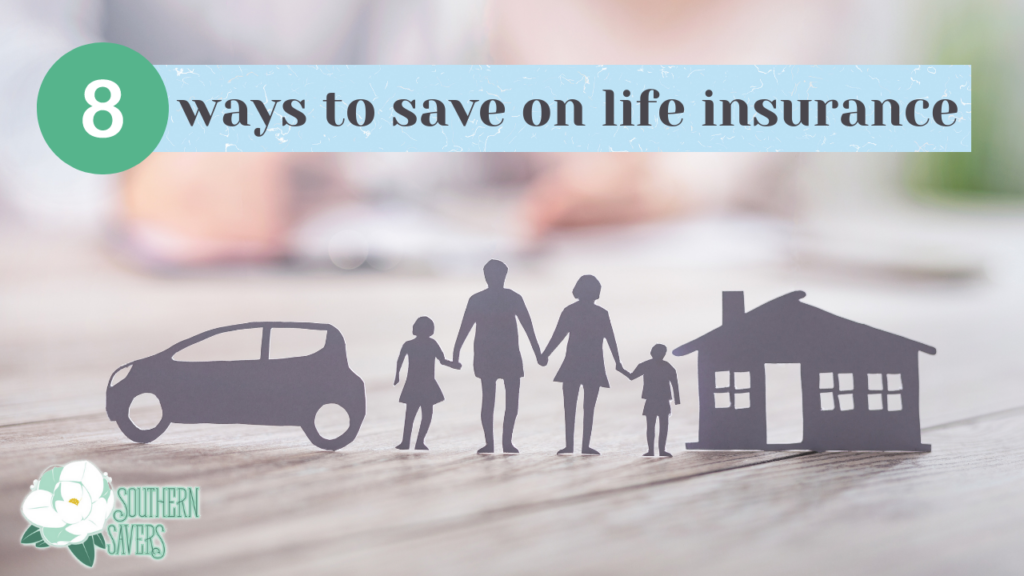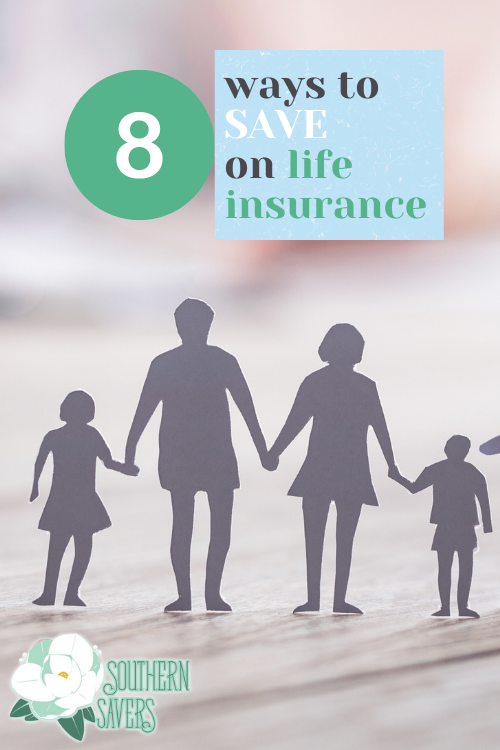This post may contain affiliate links. Read our disclosure here.

When it comes to bills that should be renegotiated yearly, insurance is one of them. If you’re trying to figure out how to cut budget costs, let’s take a look at ways to save on life insurance. If you are thinking this is something you don’t need or that you’ll get to later, I would urge you to get life insurance over cable! Don’t put this off thinking you’ll get to it later either; no one reading this knows the day or hour (not to be harsh, but it’s the truth, folks). Since we can’t avoid it, here are 8 ways to save on life insurance.
8 Ways to Save on Life Insurance
Shop Around
Insurance like many other bills is one to definitely call around and get different quotes for. However you want to go with a well known brand/company as well. This isn’t something that you want to find went out of business or can’t pay when you really need it.

Join a Group Plan
If life insurance is offered through your work, see how much it would cost to add more coverage to your policy. Many health insurance group policies come with $10-$15,000 in coverage, but you’ll need more than that in reality.
If your work doesn’t have this option look at joining a professional organization in your field. My husband is a member of IEEE and through this we get Term Life Insurance crazy cheap. For coverage of $500,000 on each of us and $10,000 per child, we pay $24 a month. The yearly dues for IEEE are $197 or $16.50 per month so we are still getting this for $40.50 a month. We get more out of IEEE than just insurance, but if that’s all you join for it’s still a deal. Many other organizations offer group term life, so check into what your career or schooling might qualify you for. Also check with your employer; they may cover the group annual membership dues for you!
Term vs. Whole Life
Very few carriers sell whole life anymore, so that pretty much answers that question for you. In reality though, whole life isn’t a deal and most financial planners will agree, you always want to get a term policy. The difficulty in term life, though, is that if you have cancer, a heart attack, etc., it will be very hard to get a new policy when your term ends. This is why many will pick the 20 year term life over a 10 year policy. For the next 20 years, you still have your policy. Keep in mind the rates will go up as you age, but the policy won’t be canceled if you get sick.
Whole life is what its name says—insurance that is yours forever as long as you pay for it. Whole life also builds cash value over time. However, the rates that it grows in value are nothing like what you would see if you just invest the money wisely. That’s why most financial folks will steer you towards term life.
Tip: See if your term policy comes with a renewal guarantee. This doesn’t mean your premium will stay they same, but it does mean that they will re-insure you after the term ends no matter your health condition.

Buy Only What You Need
One of best savings tips would be to not over buy in the first place. This fits for life insurance as well. Many financial planners will tell you to take your current salary and multiply by 7. An insurance agent will almost always say even more than that…
What we thought about when we were looking was that we wanted enough coverage to pay off our mortgage plus cover the spouse left and the kids for two years as they get back on their feet. Leaving one of us with 5 kids and only having $100,000 policy would financially break us. I’ve personally seen two families in the past few years that had to sell their homes, take on multiple jobs etc. to try to stay afloat after a husband passed unexpectedly. That’s not how you want to work through your grief.
Ask About Premium Discounts
Many plans offer rate discounts for certain amounts of coverage, meaning a $250,000 plan might actually cost less than a $200,000 plan. The discount tends to kick in the more coverage you purchase.
As I shared above we have a lot of life insurance coverage, but part of that was that it was so cheap. We could have $450,000 in coverage for $25 a month or $500,000 in coverage for $24.
Never Smoke. Ever.
Not only will smoking kill you (hopefully that’s not news to you) but it’s going to cost you a lot when you are shopping for insurance. Some plans won’t even cover you if you currently a smoker.

Get Re-Evaluated
If you lose weight, stop smoking, or stop sky diving you should contact your insurer to see if they can reconsider your rate. You’ll need to provide proof, but it can be well worth it (yet another reason to lose those extra pounds).
Also re-evaluate the amount of insurance you have from time to time. If you have a new baby you might need more, or if you pay off your debts you may could decrease it a bit.
Pay Yearly
Most plans give a small discount for paying the premiums in advance. You’ll also save any monthly billing fees that some businesses are charging as well.

A final thought about kids
This is a point that will be argued for generations to come. It’s about a 50/50 split from folks on whether it’s worth it or not to get a small policy for your children. Think of all the Gerber plan junk mail you get! Children have a very low probability of dying, but it can happen. The other reason folks will recommend it is to cover your children now in case they become uninsurable later (cancer diagnosis, etc.). They at least have a policy. I would recommend that you base your decision on cost. For us to add on $10,000 policies for every kid was an increase of 40¢ per month total or 8¢ per child. That’s enough to bury them; they don’t need any more than that since they aren’t income earners for the household.



